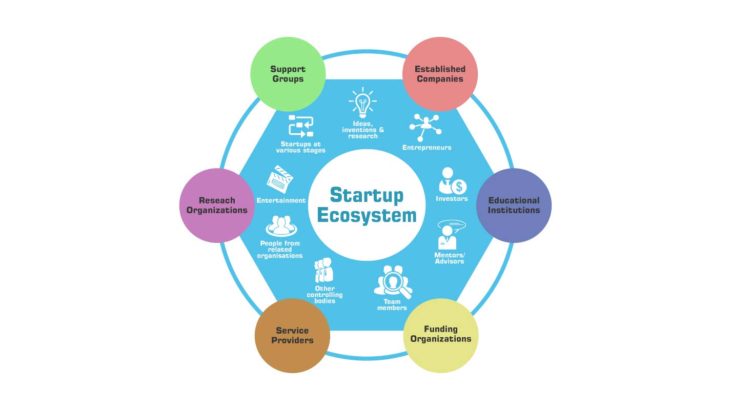Navigating the Startup Ecosystem: Key Insights for Entrepreneurs in 2025
Introduction:
The startup ecosystem is an ever-evolving environment where innovation, creativity, and risk-taking intersect to create groundbreaking businesses. For entrepreneurs, understanding the intricacies of this ecosystem is crucial to successfully navigating the challenges of building and scaling a startup. In 2025, the startup ecosystem is more dynamic than ever, with new trends, technologies, and investor strategies shaping the future of entrepreneurship. In this article, we’ll explore the key components of the startup ecosystem, the role of investors, accelerators, and incubators, and offer practical advice for startups looking to thrive in this fast-paced world.
What is the Startup Ecosystem?
A digitalmarketing tips.info refers to the network of organizations, individuals, and resources that support the growth and development of early-stage businesses. It includes:
- Entrepreneurs: The innovators and visionaries who create the startup ideas and lead them to market.
- Investors: Venture capitalists, angel investors, and crowdfunding platforms that provide the financial backing to scale ideas.
- Accelerators and Incubators: Organizations that provide startups with mentorship, resources, and funding in exchange for equity.
- Service Providers: Legal, marketing, financial, and technical experts who assist startups in managing day-to-day operations.
- Universities and Research Institutes: Institutions that provide intellectual property, research, and talent to startups.
- Government Support and Policies: National and local governments that offer grants, tax incentives, and other programs to support innovation.
Key Components of the Startup Ecosystem
-
Entrepreneurial Culture: At the heart of every successful startup ecosystem is a strong entrepreneurial culture. This culture encourages risk-taking, collaboration, and resilience. Entrepreneurs who thrive in an ecosystem are often those who embrace challenges, learn from failure, and iterate quickly. A vibrant startup culture is vital for fostering creativity and attracting top talent.
-
Access to Capital: One of the most crucial elements of a startup ecosystem is access to capital. In the early stages of a startup, funding is essential to convert an idea into a viable product or service. Angel investors, venture capitalists (VCs), and crowdfunding platforms play a key role in providing the necessary financial backing. In 2025, we’re also seeing an increase in the availability of alternative funding sources, such as equity crowdfunding, tokenized assets, and decentralized finance (DeFi) platforms.
-
Mentorship and Networking: A robust mentorship and networking environment can accelerate the growth of startups. Founders who can tap into the expertise of seasoned entrepreneurs, successful executives, and investors gain valuable insights that can help them avoid common pitfalls. Networking events, startup conferences, and industry meetups provide opportunities for entrepreneurs to connect with the right people, gain exposure, and build partnerships.
-
Innovation Hubs and Co-Working Spaces: Co-working spaces and innovation hubs are physical spaces that encourage collaboration, creativity, and interaction between entrepreneurs, freelancers, and professionals from different industries. These spaces are a hotbed of innovation, fostering new ideas and giving startups the chance to scale quickly through shared resources, mentoring, and business development opportunities.
-
Government and Legal Framework: A supportive government framework is a crucial factor in the growth of a startup ecosystem. This includes favorable tax policies, grants, and subsidies for research and development (R&D), as well as efficient legal structures for business registration and intellectual property (IP) protection. Governments can also support innovation by creating policies that encourage foreign investment and facilitate global expansion.
Global Startup Ecosystem Trends in 2025
-
Remote-first Startups: The COVID-19 pandemic changed how startups operate, with remote work becoming the norm. By 2025, remote-first startups are becoming increasingly common, with teams collaborating across borders. This model allows startups to tap into a global talent pool and lower overhead costs associated with physical office spaces.
-
Sustainability and Impact-driven Startups: Consumers and investors alike are placing increasing importance on sustainability and social impact. Startups in 2025 are leveraging new technologies to tackle global challenges, including climate change, inequality, and access to healthcare. Startups focusing on environmental, social, and governance (ESG) factors are gaining traction in the investment world, driving both financial returns and positive societal impact.
-
Artificial Intelligence and Automation: Startups are increasingly adopting AI and automation technologies to streamline processes, enhance user experience, and create new business models. From AI-driven customer support to blockchain-based supply chains, the integration of these technologies is reshaping industries and offering significant opportunities for innovation.
-
Diversity and Inclusion in Startups: In 2025, diversity and inclusion have become a central focus in the startup world. Investors and entrepreneurs are prioritizing diverse teams and inclusive cultures that foster creativity and drive innovation. Research consistently shows that diverse teams are more likely to produce successful products and drive business growth.
Challenges Facing Startups in 2025
-
Intense Competition: The startup world is highly competitive, and new startups face fierce competition to secure funding, customers, and talent. Standing out in a crowded market requires a strong value proposition, innovative product offerings, and effective marketing strategies.
-
Raising Capital: While venture capital and angel investments are readily available, securing funding can still be a major hurdle for startups. In 2025, investors are becoming more selective, focusing on startups with sustainable business models, scalable growth potential, and experienced teams.
-
Talent Acquisition and Retention: Recruiting and retaining top talent is one of the most significant challenges for startups. In a global job market, startups must offer competitive salaries, attractive benefits, and opportunities for professional growth to attract skilled employees.
How to Succeed in the Startup Ecosystem
-
Leverage Networks and Mentorship: Building a strong network of mentors, advisors, and fellow entrepreneurs can provide invaluable support. Attend startup events, join incubators or accelerators, and engage with local entrepreneurship communities.
-
Focus on Product-Market Fit: A successful startup must have a product or service that solves a real problem for a specific target audience. Before scaling, ensure that you’ve achieved product-market fit—when your product meets the needs of the market and resonates with your customers.
-
Understand Your Customers: Customer feedback is crucial in the early stages of any startup. Understanding your customers’ pain points, preferences, and buying behaviors will help you build a product that truly adds value. Continuously iterating based on feedback can set you apart from competitors.
-
Secure the Right Funding: Choose investors who align with your vision and values. Consider various funding options, including venture capital, angel investors, or crowdfunding, depending on your business model and growth stage. Always remember that securing capital is a marathon, not a sprint.
Conclusion:
The startup ecosystem in 2025 offers vast opportunities for entrepreneurs to innovate and scale. By understanding the components of the ecosystem, embracing emerging trends, and overcoming challenges, startups can thrive in this competitive landscape. Entrepreneurs who harness the power of collaboration, access to capital, and technology will be well-positioned to succeed in the ever-changing world of startups. Whether you’re just starting your entrepreneurial journey or looking to scale, the key to success is building a strong foundation within the startup ecosystem.








